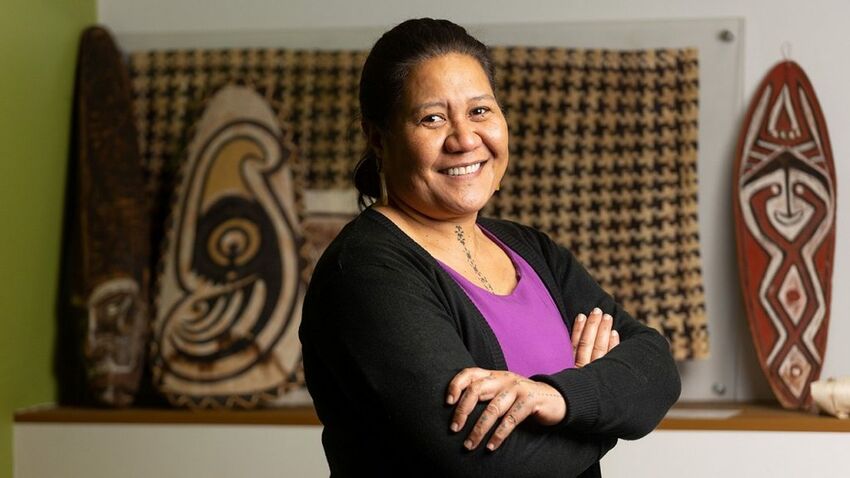Professor Jemaima Tiatia-Siau: “If you’re not invited to the table, set up your own”

Jemaima Tiatia-Siau
Samoan
Researcher / Academic
By Lefaoali’i Dr Dion Enari
As a child Jemaima Tiatia-Siau caught a glimpse of a university building and a voice called her unmistakingly clear - ‘you will be here one day’.
Today she sits as a full Professor and Pro Vice Chancellor Pacific at the University of Auckland. Here she talks to Lefaoali’i Dr Dion Enari about her academic journey and her vision for Pacific people.
Malo lava le soifua, please tell us a bit about yourself, your village, family ties?
Mālo lava le soifua. I am a daughter of Sāmoa with roots in Sālelologa, Taga, Vaimoso, Siumu, Vaigaga and Fusi Safata. I also carry the lineage of Tongan, English and French ancestry with me. I was born in Tokoroa, Aotearoa and have spent most of my life in West Auckland.

What are you proud of most as a Pacific person?
There are so many things to be proud of, but simply put, being Sāmoan, being Tagata o le Moana, and giving as best I can to serving our families and communities in whatever capacity that may be.
What motivated you to be in academia and become a professor?
I have been intentional in where my tautua lies, and anything that has transpired from this has been an added bonus; becoming a professor was certainly not one of them, yet here we are.
It is a milestone reached, that I could have, in no way, attained without family, friends, mentors, colleagues and communities. It seriously does take a village.

What is the most rewarding part of being a Pacific academic and why?
A real highlight for me is witnessing students cross the stage during graduation and observing the immense pride on the faces of their loved ones. Every year, when I look at both young and mature scholars, I know that I know that, for many, they’ve experienced some of the most challenging and toughest times of their lives, and yet here they are, as they walk, dance, wheel themselves, fa’aumu (cheeehooo!) across the graduation stage, carrying their family names, representing their villages, all of it!
How do you navigate being a Pacific person in academia?
Leadership, I find, comes naturally to many Pacific peoples, it’s how one harnesses it and employs itacross multiple settings; not just locally, but globally as well.
Being adaptable and learning to trust yourself and value the worldviews you bring to a table are pivotal; those same views and values that have traditionally been on the periphery have a place at any table. Don’t let anyone tell you or make you feel like they are not.

What is your advice for our people, particularly our young people?
It’s okay to disrupt, albeit respectfully, and cause no further harm, and if you’re not invited to the table, it's time to set up your own.
Be for the people, always for the people.
Where do you see our people in academia?
There are still work-ons and until society’s mindsets, attitudes and behaviours change, then the cadence for transformation will be excruciatingly slow, if at all!
There is definitely a place for Pacific peoples in the academy, and like anything, it's a question of how much one wants it.
-
Professor Jemaima Tiatia-Siau is Pro Vice-Chancellor Pacific at Waipapa Taumata Rau – The University of Auckland. She was also recently a board member on New Zealand's Mental Health and Wellbeing Commission. A New Zealand-born Sāmoan, her gafa (genealogy) hails from the Sāmoan villages ofSālelologa, Taga, Vaimoso, Siumu, Vaigaga and Fusi Safata. Her research interests include: suicide prevention, health inequities, Pacific Studies and youth development.
Lefaoali’i Dr Dion Enari is a Senior Lecturer at the School of Sport and Recreation, Faculty of Health and Environmental Sciences at Auckland University of Technology. He holds a PhD in Samoan culture from Bond University, Gold Coast with a Master of International Relations from Griffith University. His Lefaoali’i (high talking Chief) title is from Lepa, Samoa. His research interests include Sport Management, Sport Leadership, Mental Health, Pacific language, Indigenous Studies, and Trans-nationalism.
